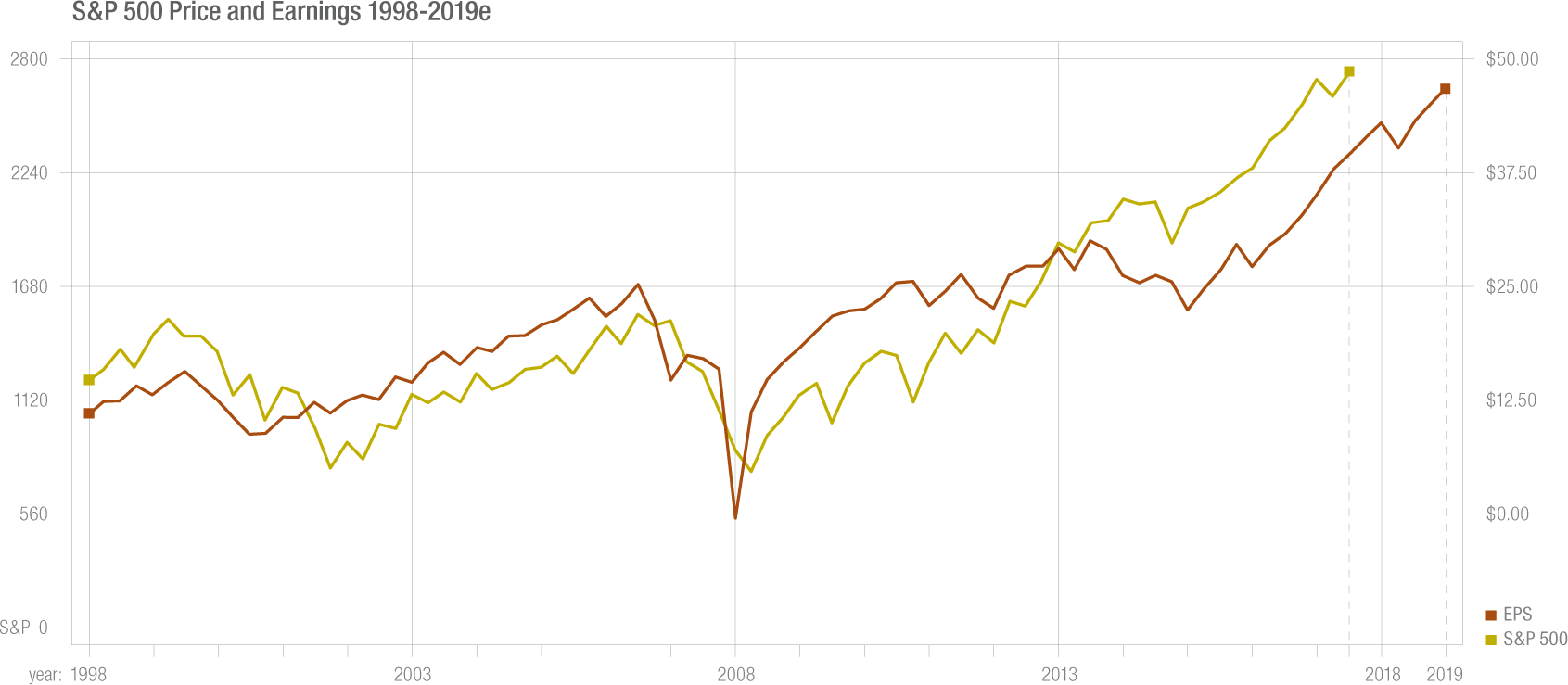Login

Earnings and the Stock Market
Corporate Earnings Drive Stock Prices
Despite the daily news commentary about what is causing the stock market to go up and down on any given day, the single biggest impact on the direction of the stock market over time is the earnings of the companies listed on the stock market.
The chart below shows the relationship between earnings and the S&P500 price. We like to use the S&P500 for our research because it has the longest data set and the numbers are publicly available. The correlation between earnings and price is 71%. It doesn’t track perfectly, but it is the most reliable relationship that we found to price movement.

It is particularly helpful to be reminded of this when the daily gyrations of the market seem to be mostly random. On a day-to-day basis, there are many things that can impact the stock market. But over time, earnings are the main driver and we find comfort in that.
You can see on the above chart that the blue line extends beyond the red line. The blue line represents the forecasted earnings going out to 2019. The price doesn’t extend because the price can’t be accurately forecasted. We track the forecasted earnings because we think it provides some guidance to the direction of the market. 2018 forecasted earnings are very strong due to 1) the corporate tax cut, and 2) strong sales growth. The current earnings growth estimate for the S&P500 for 2018 is 22.5% and 2019 is 9.7%. It is only when earnings go negative that we have had recessions and with over 9% growth expected in 2019, we have a decent cushion of growth.
Corporate Earnings Don't Always Follow GDP Growth
How can corporate earnings grow faster than GDP growth? Remember that GDP measures spending of consumers, government, and business investment, with the net of imports minus exports added in. Earnings measure what a company earns on its sales, which includes foreign sales and profit margin growth. It’s apples and oranges—measuring two different things.
Company earnings also include price increases on their goods and services, so earnings keep up with inflation. Moderate inflation is good for company earnings but high inflation usually isn’t because it is harder to pass through big price increases to customers. This is one of the reasons why investing in stocks can be a good hedge against inflation, as long as inflation stays in the 2-3% annual range and doesn’t outstrip a company’s ability to keep up by raising prices. Inflation is currently about 2%.
So why don’t news commentators talk more about earnings changes as a reason for stock price movement? First, it’s boring because it doesn’t change much from day-to-day. It’s not very interesting to hear about a 0.1% change in a market earnings forecast, up or down. It’s more exciting to hear about the big price movements of the day and speculate about why.
Companies Report Earnings Every Three Months
During quarterly earnings announcements, there is more news about it, but it’s still slow moving. Much of the meaningful quarterly news is about expectations versus actual results, which is what professional investors care about. As an individual investor, it’s more difficult to find out expectations and it is time consuming to track it, especially if your primary job is not related to investments.
The volatility of individual stocks and the difficulty of forecasting a single company’s earnings is one of the big reasons why buying index funds is a safer way to invest in the stock market than buying individual stocks. Even the best companies have earnings hiccups along the way, which can crush their stock price. By buying an index fund, the diversity of so many stocks in so many different industries helps smooth the volatility.
The important decision is to consider how much stock market exposure to have in your portfolio, given your risk tolerance and need for growth. For most people, buying individual stocks, or hiring other people to buy individual stocks for you and paying high fees to do it, is a recipe for disaster. There are multiple options to buy index funds and they are usually the most cost effect way to invest in stocks.
Source: https://us.spindices.com/indices/equity/sp-500 for data; actual earnings are used prior to the first quarter 2018, estimates are included after that date.



